|
|
|
Sort Order |
|
|
|
Items / Page
|
|
|
|
|
|
|
| Srl | Item |
| 1 |
ID:
109586
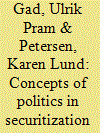

|
|
|
|
|
| Publication |
2011.
|
| Summary/Abstract |
The article argues that there are a number of concepts of politics in play in the current debates on securitization theory and that greater awareness regarding these conceptual differences helps clarify not only theoretical differences but also the possibilities for new theoretical development and reflection. The article identifies three conversations on politics: first, a conversation on how politics concerns action and intentionality; second, a conversation on the modern organization of politics, spheres and sectors; and, third, a conversation on the relationship between politics, ethics and science. Where the first and third conversations refer to politics as an act, in the second conversation politics is inherently tied to the institutional or spatial structures of government - the state, the public, the political field, spheres, sectors or function.
|
|
|
|
|
|
|
|
|
|
|
|
|
|
|
|
| 2 |
ID:
099885
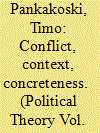

|
|
|
|
|
| Publication |
2010.
|
| Summary/Abstract |
In Reinhart Koselleck's history of concepts, the general orientation that concepts are to be understood in their proper contexts is intertwined with the assumption that they are manifestations of particular political conflicts. The essay shows that the dense compound of context and conflict in Koselleck's thought springs from Carl Schmitt's political theory and also forms an important point of continuity between Koselleck's early work and his later methodological writings. The formalized assumption of conflict, somewhat problematically, binds Koselleckian conceptual history to a particular conception of politics, one that sees politics ultimately as struggle and conflict. Once the historical-theoretical contingency of this conception is recognized, it becomes both possible and necessary to reassess the role of conflict in the methodology of conceptual history.
|
|
|
|
|
|
|
|
|
|
|
|
|
|
|
|
| 3 |
ID:
097705
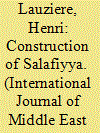

|
|
|
|
|
| Publication |
2010.
|
| Summary/Abstract |
For nearly a century of scholarship, uncertainties and paradoxes have beleaguered interpretations of the origins and meaning of Salafism (al-salafiyya). Although academics and journalists alike are well aware of the various definitions and conflicting narratives of Salafism, relieving some of the confusion that beclouds the term continues to prove difficult. Given that concepts are fluid and relational, this state of affairs may seem inevitable. Yet there are reasons to believe that the current confusion surrounding Salafism is in part attributable to faulty scholarship and that consequently the substance and history of this religious orientation will remain unnecessarily puzzling so long as the production of knowledge about Salafism goes unexamined. In that sense, recent scholarly efforts to remedy the situation by providing deeper insights into the intellectual, geographical, and political diversity of Salafism have produced mixed results, for they have largely overlooked two of the most persistent epistemological problems that are at the root of much of the present-day ambiguity.
|
|
|
|
|
|
|
|
|
|
|
|
|
|
|
|
| 4 |
ID:
172373
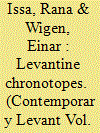

|
|
|
|
|
| Summary/Abstract |
Like all contested concepts, the term ‘Levant’ is unstable. Both its academic and political uses are geographically and historically fairly loose and ill-defined. This geo-historical instability makes room for the multiplicity of chronotopes that the contributors lay out in this special issue. In order to bring these contributions together, we also use the theoretical concept of the chronotope, the way that authors and actors under study bring together time and space in their legitimation of political efforts in the present. The chronotopes treated here have far-reaching implications in our experience and knowledge of the Levant. With Bakhtin’s chronotopic method, we approach the region through its entangled history, taking people’s mobility, their composite identities, and the major transformations in their lives as the central concern for analysis.
|
|
|
|
|
|
|
|
|
|
|
|
|
|
|
|
| 5 |
ID:
082702
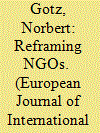

|
|
|
|
|
| Publication |
2008.
|
| Summary/Abstract |
In this article I aim to provide a better understanding of the concept `non-governmental organization' and its implications for the politics of international relations. As the prevailing confusion about the term stems largely from poor knowledge about the politics behind its introduction and function, the overarching question asks how NGOs have been socially constructed as actors on the margins of the international stage. To this end, a sound insight into the little-known conceptual history and background of the term `NGO' in what might be called a `Westphalian nomenclature' is given. I suggest that the still prevalent NGO terminology is an outcome of political games played by various actors, restricting and containing the signified organizations. The article provides a non-substantial, functional and politics-oriented definition of the term NGO, which differs significantly from previous attempts to attach meaning to it. It also suggests improved choices of terminology for general International Relations theorizing
|
|
|
|
|
|
|
|
|
|
|
|
|
|
|
|
| 6 |
ID:
117916
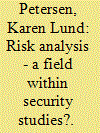

|
|
|
|
|
| Publication |
2012.
|
| Summary/Abstract |
The academic environments of risk analysis and security studies had hardly 'spoken' to one another until recently. The two fields of study were defined within different academic disciplines: security studies a matter for International Relations (IR), and risk studies a matter for sociology, economics and the natural sciences. Increased focus on catastrophic events (terrorism, climate change, etc.) seems to have given the fields of security studies and risk analysis a common empirical theme and highlighted the need for a common research agenda. This article explores the intersection between these two fields of study, as it investigates how the 'old' disciplinary debates on risk have been translated 'into' security studies - to predict, criticize or evaluate the current political practice of security. Such analysis provides a much-needed overview of the risk debates within security studies and brings out the limits of this debate in light of the broader and much more historically settled risk debates within sociology, economics and anthropology.
|
|
|
|
|
|
|
|
|
|
|
|
|
|
|
|
|
|
|
|
|